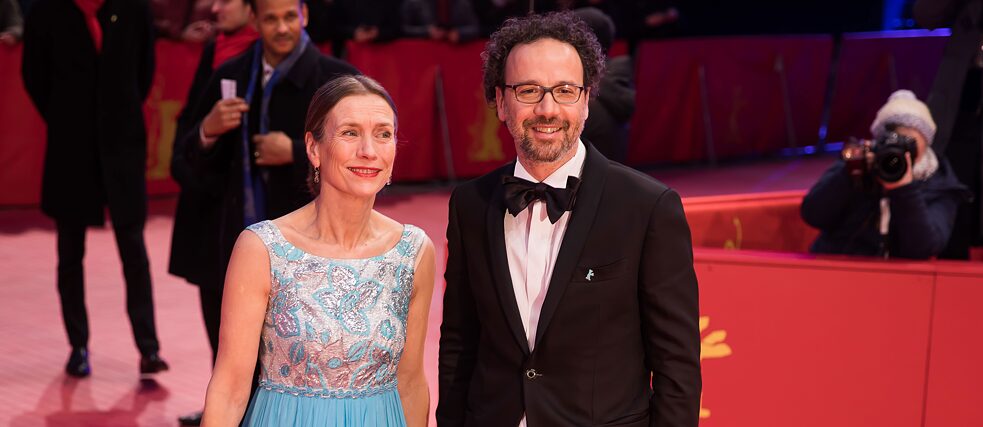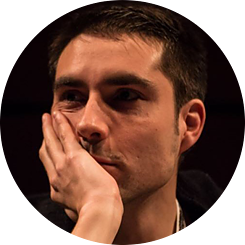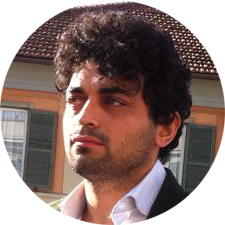Berlinale Bloggers reply
Quo vadis, Berlinale?

No longer Dieter Kosslick, but Mariette Rissenbeek and Carlo Chatrian: Can you feel the “wind of change” through the change at the top and if so, how does it manifest itself?
 Foto: © privat
Gabriele Magro - Italy: This is my first Berlinale, so it’s hard for me to compare it to previous editions. Nonetheless, two things I can safely say are that the atmosphere here is energetic and that I’m happy to see so many Italians involved in the festival, from the staff to the many directors displaying their work here in Berlin.
Foto: © privat
Gabriele Magro - Italy: This is my first Berlinale, so it’s hard for me to compare it to previous editions. Nonetheless, two things I can safely say are that the atmosphere here is energetic and that I’m happy to see so many Italians involved in the festival, from the staff to the many directors displaying their work here in Berlin.
 Foto: © privat
Ieva Sukyte - Lithuania: The main change in the festival this year is the new competition programme, “Encounters”, although with 350 films in total, including the shorts, it’s hard to keep the track of all changes. The loss of one of the most important Berlinale cinema theatres, Cinestar in the Sony Centre, made it harder for industry and press to catch side programme films. But it is the first year for the new directors and you can see that they are both moving in the right direction, since Competition films were stronger this year than in previous editions.
Foto: © privat
Ieva Sukyte - Lithuania: The main change in the festival this year is the new competition programme, “Encounters”, although with 350 films in total, including the shorts, it’s hard to keep the track of all changes. The loss of one of the most important Berlinale cinema theatres, Cinestar in the Sony Centre, made it harder for industry and press to catch side programme films. But it is the first year for the new directors and you can see that they are both moving in the right direction, since Competition films were stronger this year than in previous editions.
 Foto: © privat
Erick Estrada - Mexico: There is no doubt that the Berlinale, Berlin, and the world is changing. Last year was my first at the Festival and yes, you can feel a different point of view at the Berlinale. I am not sure if I can explain this correctly, but it feels like there are new voices, and new lights in the old stories that movies always bring to us. In a nutshell: new colors in the same old (good) stories.
Foto: © privat
Erick Estrada - Mexico: There is no doubt that the Berlinale, Berlin, and the world is changing. Last year was my first at the Festival and yes, you can feel a different point of view at the Berlinale. I am not sure if I can explain this correctly, but it feels like there are new voices, and new lights in the old stories that movies always bring to us. In a nutshell: new colors in the same old (good) stories.
 Foto: © Privat
Sarah Ward - Australia: Change at an event the size and scale of Berlinale doesn’t just blow in with two new directors, especially in a year when celebrating the festival’s longevity, legacy, and history is in order on the occasion of its 70th anniversary. Instead, the 2020 Berlinale feels more like a precursor for future change – the addition of a new competitive program, “Encounters”, notwithstanding – rather than a considerable leap in itself. That said, artistic director Carlo Chatrian is clearly a different programmer with different tastes, interests, and priorities to ex-director Dieter Kosslick.
Foto: © Privat
Sarah Ward - Australia: Change at an event the size and scale of Berlinale doesn’t just blow in with two new directors, especially in a year when celebrating the festival’s longevity, legacy, and history is in order on the occasion of its 70th anniversary. Instead, the 2020 Berlinale feels more like a precursor for future change – the addition of a new competitive program, “Encounters”, notwithstanding – rather than a considerable leap in itself. That said, artistic director Carlo Chatrian is clearly a different programmer with different tastes, interests, and priorities to ex-director Dieter Kosslick.
 Foto: © privat
Javier H. Estrada - Spain: I’ve been attending the Berlinale for the past 15 years, and I can honestly say that this edition has been the most interesting, thought-provoking, and stimulating. In the official competition you found amazing works such as DAU.Natasha by Ilya Khrzhanovskiy and Jekaterina Oertel, a pivotal work in the section, which I don’t think would have been selected in previous years. Also, the section “Encounters” offered a chance to discover some of the most risky and audacious works in contemporary cinema.
Foto: © privat
Javier H. Estrada - Spain: I’ve been attending the Berlinale for the past 15 years, and I can honestly say that this edition has been the most interesting, thought-provoking, and stimulating. In the official competition you found amazing works such as DAU.Natasha by Ilya Khrzhanovskiy and Jekaterina Oertel, a pivotal work in the section, which I don’t think would have been selected in previous years. Also, the section “Encounters” offered a chance to discover some of the most risky and audacious works in contemporary cinema.
 Foto: © privat
Yun-hua Chen - China: I like the fact that the program is more compact this year and its cinephile approach is tactile. Also, the dialogues at “On Transmission” brought an inspiring angle to the festival. Although the boundary between Competition and “Encounters”remains to be seen, it is thought-provoking to observe the interchangeability of certain films across categories. In fact, the most mind-blowing film I saw this year came from the new section, “Encounters”: The Trouble of Being Born. With some sorrow, I miss the Berlinale bear, which is no longer on the poster design.
Foto: © privat
Yun-hua Chen - China: I like the fact that the program is more compact this year and its cinephile approach is tactile. Also, the dialogues at “On Transmission” brought an inspiring angle to the festival. Although the boundary between Competition and “Encounters”remains to be seen, it is thought-provoking to observe the interchangeability of certain films across categories. In fact, the most mind-blowing film I saw this year came from the new section, “Encounters”: The Trouble of Being Born. With some sorrow, I miss the Berlinale bear, which is no longer on the poster design.
 Foto: © Privat
Egor Moskvitin - Russia: This is only my third Berlinale so far, so, I am afraid I can’t judge competently. But it seems to me that the new programming team remains loyal to the principles, structure, and logic of previous festivals. Films selected for the main competition were still focused on exploring the complexity of our world as seen by artists with different cultural and national backgrounds. There are still a few timeless films (First Cow and Days) that refer not to the zeitgeist or current struggles, but to the very essence of human nature. And there are still “agent provocateur” movies that were chosen in order to encourage the festival crowd to discuss what is more important in storytelling: ethics or aesthetics? So the Berlinale seems to be remaining loyal to its selected course and we may need more time to feel the changes.
Foto: © Privat
Egor Moskvitin - Russia: This is only my third Berlinale so far, so, I am afraid I can’t judge competently. But it seems to me that the new programming team remains loyal to the principles, structure, and logic of previous festivals. Films selected for the main competition were still focused on exploring the complexity of our world as seen by artists with different cultural and national backgrounds. There are still a few timeless films (First Cow and Days) that refer not to the zeitgeist or current struggles, but to the very essence of human nature. And there are still “agent provocateur” movies that were chosen in order to encourage the festival crowd to discuss what is more important in storytelling: ethics or aesthetics? So the Berlinale seems to be remaining loyal to its selected course and we may need more time to feel the changes.
 Foto: © privat
Anjana Singh - India: Due to this year's change in the top management I did not feel any “wind of change”! The program selection was very good. The festival itself was just as perfectly organized as under Dieter Kosslick. Only the Berlinale app was unfortunately cancelled.
Foto: © privat
Anjana Singh - India: Due to this year's change in the top management I did not feel any “wind of change”! The program selection was very good. The festival itself was just as perfectly organized as under Dieter Kosslick. Only the Berlinale app was unfortunately cancelled.
 Foto: © Privat
Andrea D’Addio - Italy: This is my thirteenth Berlinale. I don't see a break with previous editions, it seems to me that a continuity is emerging between the old and the new artistic direction. I think it takes more time to see the fruits of this “wind of change” and can only note that there are less films than before. There is more time to talk about films with colleagues and spectators, which is a good thing.
Foto: © Privat
Andrea D’Addio - Italy: This is my thirteenth Berlinale. I don't see a break with previous editions, it seems to me that a continuity is emerging between the old and the new artistic direction. I think it takes more time to see the fruits of this “wind of change” and can only note that there are less films than before. There is more time to talk about films with colleagues and spectators, which is a good thing.
 Foto: © privat
Hyunjin Park - Korea: It is positive that the sections are clearly organized this year. I would also like to acknowledge the new directors' efforts to bring aspects of sustainability and diversity to the festival. In particular, I think there has been significant progress in gender equality. I want to applaud these efforts, as it is the first year that the executive has changed.
Foto: © privat
Hyunjin Park - Korea: It is positive that the sections are clearly organized this year. I would also like to acknowledge the new directors' efforts to bring aspects of sustainability and diversity to the festival. In particular, I think there has been significant progress in gender equality. I want to applaud these efforts, as it is the first year that the executive has changed.
 Foto: © Privat
Philipp Bühler - Germany: Locarno's sun is not yet shining on Potsdamer Platz, so far the change in leadership is mainly reflected in the thinned-out programme. As for the competition, with Berlin, Alexanderplatz, DAU. Natasha, films by Christian Petzold, Abel Ferrara and Sally Potter – presumably Dieter Kosslick, the former festival director, would not have left any of them out. I believe that the major changes will only take place in the coming years, in complicated negotiations with the other sections. The interesting second competition “Encounters” is a first sign.
Foto: © Privat
Philipp Bühler - Germany: Locarno's sun is not yet shining on Potsdamer Platz, so far the change in leadership is mainly reflected in the thinned-out programme. As for the competition, with Berlin, Alexanderplatz, DAU. Natasha, films by Christian Petzold, Abel Ferrara and Sally Potter – presumably Dieter Kosslick, the former festival director, would not have left any of them out. I believe that the major changes will only take place in the coming years, in complicated negotiations with the other sections. The interesting second competition “Encounters” is a first sign.
 Photo: © Private
Camila Gonzatto - Brazil: The Berlinale certainly has a new face. A new management always leads to a new view. That brings new moods, even if the new division of the sections is still a bit confused. But the changes are also taking place beyond the screen. With exhibitions scattered all over the city, the audience is less concentrated at Potsdamer Platz. This makes them lose a little of the feeling of being among a festival audience.
Photo: © Private
Camila Gonzatto - Brazil: The Berlinale certainly has a new face. A new management always leads to a new view. That brings new moods, even if the new division of the sections is still a bit confused. But the changes are also taking place beyond the screen. With exhibitions scattered all over the city, the audience is less concentrated at Potsdamer Platz. This makes them lose a little of the feeling of being among a festival audience.
 Photo (Detail): © Goethe-Institut
Jutta Brendemühl - Canada: “The festival doesn’t need dramatic changes,” new director Carlo Chatrian said before the 70th Berlinale opened. But he got some, planned or not: dual leadership, new team, 15 % less films. Cut: many pressers, two sections, some cinemas. Added: a second competition like Cannes' or Venice's. In the end, the program was less “arthouse-y” than expected (also unfortunately less Indigenous than hoped). Plus ça change, but one festival does not make a new era. Kudos to Mariette and Carlo for their grit!
Photo (Detail): © Goethe-Institut
Jutta Brendemühl - Canada: “The festival doesn’t need dramatic changes,” new director Carlo Chatrian said before the 70th Berlinale opened. But he got some, planned or not: dual leadership, new team, 15 % less films. Cut: many pressers, two sections, some cinemas. Added: a second competition like Cannes' or Venice's. In the end, the program was less “arthouse-y” than expected (also unfortunately less Indigenous than hoped). Plus ça change, but one festival does not make a new era. Kudos to Mariette and Carlo for their grit!